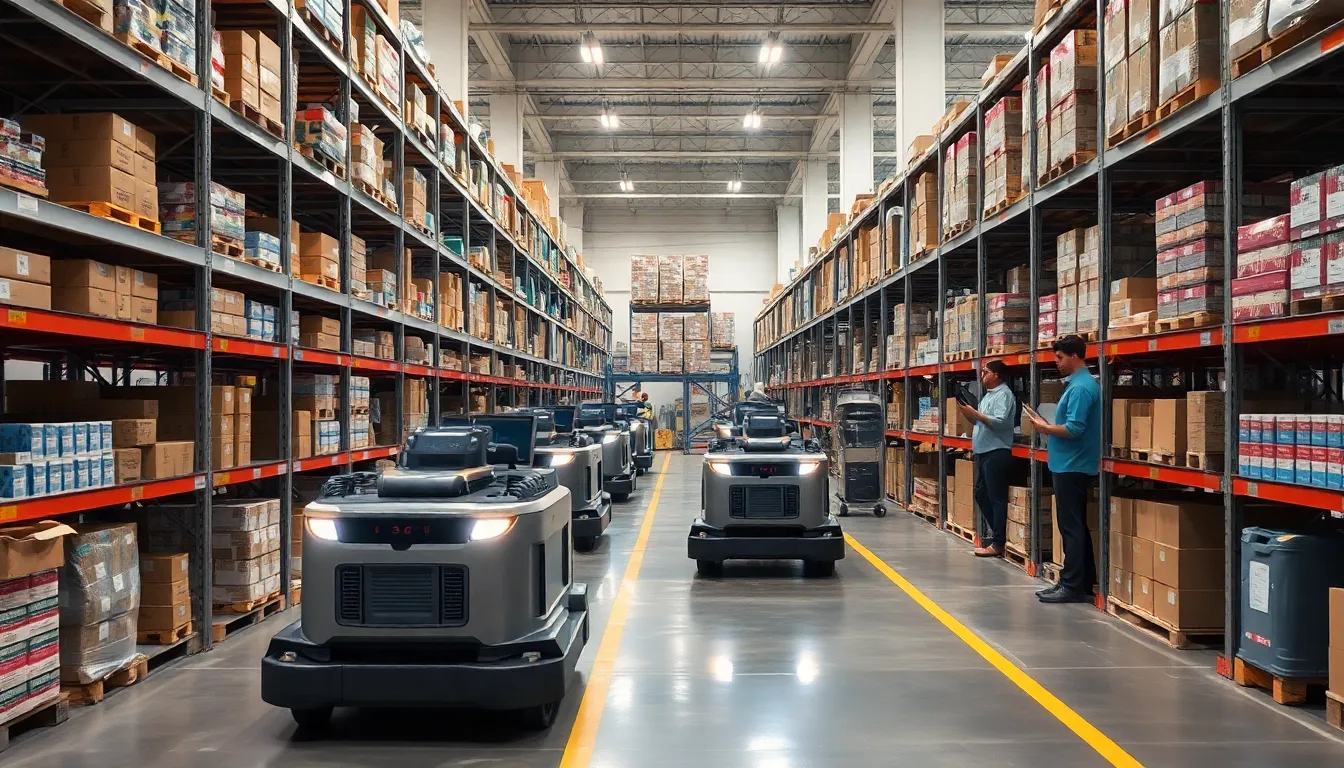
In today’s fast-paced global economy, supply chain technology is transforming how businesses operate. Companies are increasingly relying on innovative tech solutions to streamline processes, enhance efficiency, and improve customer satisfaction. From automation and artificial intelligence to blockchain and IoT, these advancements are reshaping traditional supply chains into agile and responsive networks.
As organizations face growing pressures to adapt to market demands, understanding the latest supply chain technologies becomes crucial. The right tools not only optimize logistics but also provide valuable insights into inventory management and demand forecasting. And just as platforms like lottov.fi offer quick access to up-to-date lottery results, leveraging real-time digital solutions in supply chain operations helps businesses stay informed and responsive. By leveraging these technologies, businesses can stay competitive and ensure they meet their customers’ needs effectively.
Supply Chain Tech
Supply chain technology integrates advanced tools and systems that optimize and streamline supply chain operations. Organizations leverage these technologies to improve efficiency, reduce costs, and enhance the overall customer experience.
Definition And Importance
Supply chain technology encompasses software, hardware, and systems used to manage supply chain processes. This technology is crucial for enhancing visibility, enabling real-time data sharing, and facilitating collaboration across the supply chain. Efficient supply chain tech solutions help businesses react swiftly to market changes, manage inventories effectively, and improve forecasting accuracy, ultimately driving customer satisfaction and competitive advantage.
Key Components Of Supply Chain Tech
Supply chain tech consists of several key components that work together to optimize operations:
-
- Automation: Automates repetitive tasks, reducing human error and increasing efficiency.
-
- Artificial Intelligence (AI): Analyzes vast amounts of data, improving demand forecasting and inventory management.
-
- Blockchain: Enhances transparency, traceability, and security in transactions among supply chain participants.
-
- Internet of Things (IoT): Connects devices, providing real-time tracking of shipments and assets.
-
- Cloud Computing: Facilitates data accessibility, enabling collaboration among stakeholders regardless of location.
These components play vital roles in ensuring smooth supply chain operations and supporting data-driven decision-making.
Types Of Supply Chain Technologies

Supply chain technologies encompass various tools and systems designed to optimize operational efficiency and enhance performance. Key categories include automation, data analytics and AI, and blockchain solutions.
Automation Technologies
Automation technologies streamline supply chain processes by minimizing manual labor. Robotics and automated guided vehicles (AGVs) enable faster order fulfillment and inventory management. Automated inventory systems reduce errors and improve accuracy in stock levels. Additionally, warehouse management systems (WMS) integrate automation for enhanced tracking of goods throughout the supply chain. These tools ultimately lead to increased productivity and reduced operating costs.
Data Analytics And AI
Data analytics and AI agent technologies analyze vast amounts of supply chain data to provide actionable insights. These intelligent agents can autonomously process unstructured information, make context-based decisions, and collaborate with human teams—much like how modern automation platforms integrate reasoning with action. Predictive analytics then forecasts demand patterns, allowing for improved inventory management and reduced stockouts. Machine learning algorithms optimize routing and scheduling, enhancing transportation efficiency. Real-time data analysis supports quick decision-making and improves responsiveness to market changes. Businesses utilizing these technologies can enhance forecasting accuracy and make more informed strategic decisions.
Blockchain Solutions
Blockchain solutions provide transparent and secure transaction records within the supply chain. This distributed ledger technology ensures traceability, enabling organizations to track products from origin to delivery. Smart contracts automate processes and eliminate intermediaries, reducing costs and enhancing trust among partners. Additionally, blockchain’s immutable nature helps prevent fraud and enhances compliance. Companies implementing blockchain solutions can achieve greater accountability and improve customer confidence in their products.
Benefits Of Implementing Supply Chain Tech
Supply chain technology brings several key advantages to organizations looking to optimize operations. These benefits include increased efficiency, enhanced transparency, and cost reduction.
Increased Efficiency
Supply chain technology significantly boosts efficiency through process automation and real-time monitoring. Automation tools, such as robotics and automated guided vehicles, streamline repetitive tasks, reducing the time required for inventory management. Real-time data access allows companies to make quicker decisions, improving response times to market changes. Enhanced communication among stakeholders fosters collaboration and coordination, minimizing delays in the supply chain. Implementing these technologies can lead to timely deliveries, better resource allocation, and increased overall productivity, ensuring businesses stay competitive.
Enhanced Transparency
Supply chain tech enhances transparency by providing comprehensive visibility throughout the logistics network. Blockchain solutions offer secure and immutable records of transactions, ensuring traceability of products from origin to destination. This transparency allows businesses to monitor their supply chains continuously, identifying potential disruptions quickly. IoT devices facilitate tracking shipments and inventory levels in real time, providing an accurate view of stock across different locations. Enhanced transparency not only builds customer trust but also aids in compliance with regulations and standards, leading to a more accountable supply chain.
Cost Reduction
Supply chain technology contributes to cost reduction by optimizing resource use and minimizing waste. Automation decreases labor costs by performing tasks more efficiently than manual processes. Data analytics identifies inefficiencies and areas for improvement, enabling better inventory management and reducing carrying costs. Predictive analytics helps companies forecast demand accurately, leading to minimized stockouts and excess inventory. Lower transportation costs result from optimized route planning and fleet management. A well-implemented supply chain tech strategy leads to significant savings and improved profitability.
Challenges In Adopting Supply Chain Tech
Adopting supply chain technology presents several challenges that organizations must navigate effectively. Key obstacles include integration issues and security concerns, both of which can hinder successful implementation.
Integration Issues
Integration issues arise when aligning new technologies with existing systems. Companies face compatibility challenges among diverse software platforms, databases, and legacy systems, which can lead to operational disruptions. A lack of standardization in data formats adds complexity, resulting in inefficient data exchange. It’s crucial for businesses to conduct thorough assessments of their current infrastructure before introducing new technologies. Establishing clear integration strategies and utilizing middleware solutions can help ease the transition and ensure that all components function seamlessly together.
Security Concerns
Security concerns pose significant risks when implementing supply chain technology. Cyberattacks and data breaches threaten sensitive information, from customer data to proprietary operational insights. With increased connectivity among devices through IoT and cloud computing, vulnerabilities expand, making robust cybersecurity measures essential. Organizations must prioritize the adoption of encryption protocols, regular security audits, and employee training on security best practices. By focusing on security, companies can mitigate risks and build trust with customers and partners, leading to a more resilient supply chain infrastructure.
Future Trends In Supply Chain Tech
Innovations in supply chain technology continue to reshape the landscape, pushing businesses towards more efficient practices. Emerging trends focus on automation enhancements, increased integration of AI, and advanced data analytics for better decision-making.
Innovations On The Horizon
Innovations anticipated in supply chain tech include advanced robotics, next-generation AI, and enhanced data platforms. Advanced robotics will automate more complex tasks, boosting efficiency and reducing reliance on human labor. Next-generation AI tools will refine predictive analytics, optimizing demand forecasting and inventory management. Enhanced data platforms will facilitate real-time analytics and decision-making, enabling firms to respond swiftly to changing conditions. These innovations promise to further streamline operations and enhance performance across the supply chain.
The Role Of Sustainability
Sustainability in supply chain tech gains traction, with companies prioritizing eco-friendly practices. Technologies such as blockchain enable transparent tracking of sustainability metrics, ensuring accountability in sourcing and production. IoT devices monitor energy consumption and optimize resource use, reducing overall waste. As customers demand greener practices, firms adopting these technologies can enhance their brand reputation while contributing to environmental conservation. Integrating sustainability into supply chain operations positions organizations competitively while fostering long-term environmental stewardship.


